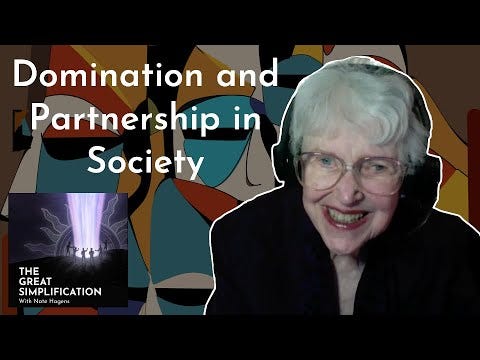Since starting this podcast, I’ve met and have learned from dozens of people, who I otherwise may never have come across - today’s guest is one such person. Riane Eisler has been working in systems science for decades studying ‘domination’ and ‘partnership’ societies.
In this episode, Riane and I discuss the relational dynamics undergirding our current societies and what it might mean to transition to healthier and more sustainable ones in the future. What we value at the individual and family level directly translates to the way we frame our governance systems - societies that emphasize empathy and caring also implement the same types of policies and values.
Riane Eisler is the President of the Center for Partnership Systems, which provides practical applications of her work, and Editor in Chief of the online Interdisciplinary Journal of Partnership Studies published at the University of Minnesota. Eisler’s innovative whole-systems research offers new perspectives and practical tools for constructing a less violent, more egalitarian, gender-balanced, and sustainable future. She is author of many books, including The Chalice and the Blade, now in its 57th US printing and 27 foreign editions, The Real Wealth of Nations, and Nurturing Our Humanity co-authored with Douglas P. Fry. For more information, see www.rianeeisler.com and www.centerforpartnership.org.
How could we foster the more cooperative side of our humanity across all scales to create empowered communities and balanced decision making? What societies - past and present - lean towards a partnership paradigm and what benefits do their people receive? Is it possible to move away from violence and control-oriented systems and into ones that value wide boundaries of empathy and understand the vital nature of care work?
In case you missed it…
In last Friday’s Frankly, I reflected on some growing dichotomies that I’m noticing in our current culture of information consumption and media. We’re increasingly bombarded with news, both from traditional media outlets as well as emerging smaller platforms. Yet interpreting these inputs depends on the individual and societal lenses we use, alongside the presentation of and quality of the information itself. Are we able to set aside our internalized perspectives of the world and listen to what is being said - rather than leaning into what our identities want us to hear?
If you appreciate The Great Simplification podcast…
Be sure to leave a review on your preferred podcast platform! Leaving reviews helps the podcast grow, which helps spread awareness of our systemic situation from experts in ecology, energy, policy, economics, technology, and community building so that we can better understand - and respond to - the challenges of the coming decade.
The Great Simplification podcast is produced by The Institute for the Study of Energy and Our Future (ISEOF), a 501(c)(3) organization. We want to keep all content completely free to view globally and without ads. If you’d like to support ISEOF and it’s content via donation, please use the link below.






hi nate
can you please share who the artist that made the black and white spiral graphic at the top of this post is?? or where you found it??
thank you